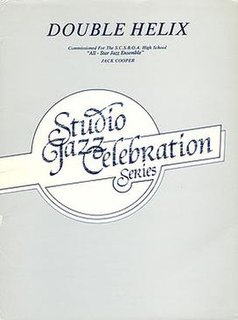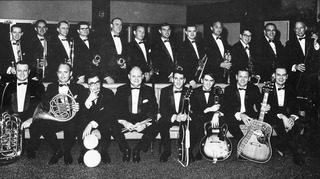 W
WBoom Shot is a 1942 song composed by Glenn Miller and Billy May for the 20th Century Fox movie Orchestra Wives starring George Montgomery and Ann Rutherford.
 W
WCommunity Swing is a swing jazz instrumental composed and recorded by Glenn Miller and released as a Brunswick 78 single in 1937 by Glenn Miller and His Orchestra.
 W
W"Double Helix" is an original music composition written for 17-piece jazz orchestra in 1991. The recording of "Double Helix" also goes by the title "Twice is Nice" when distributed worldwide as production music. The work has been used and heard around the world for music, media, and entertainment broadcasts.
 W
WIn popular music, half-time is a type of meter and tempo that alters the rhythmic feel by essentially doubling the tempo resolution or metric division/level in comparison to common-time. Thus, two measures of 44 approximate a single measure of 88, while a single measure of 4/4 emulates 2/2. Half-time is not to be confused with alla breve or odd time. Though notes usually get the same value relative to the tempo, the way the beats are divided is altered. While much music typically has a backbeat on quarter note (crotchet) beats two and four, half time would increase the interval between backbeats to double, thus making it hit on beats three and seven, or the third beat of each measure :1 2 3 4 1 2 3 4 1 2 3 4 5 6 7 8 1 2 3 4
 W
W"Hanky Panky" is a song by American recording artist Madonna from her soundtrack album I'm Breathless. It was released on June 12, 1990, by Sire Records as the album's second and final single. Written and produced by Madonna and Patrick Leonard, the song was developed from a line in the parent film, Dick Tracy, talking about a woman who enjoys being spanked by her partner. Performed in an almost comical style, "Hanky Panky" is a jazz and swing song with a changing bassline and minor to major key-shift in the chorus. It caused some controversy in Ireland because of its innuendo and racy lyrics, with women's groups deeming them as harmful; Madonna later clarified that the lyrics were intended as a joke.
 W
W"Harlem Chapel Chimes" is a 1935 jazz instrumental composed by Glenn Miller. The song was released as an A-side 78 single by the Dorsey Brothers Orchestra.
 W
WThe Heartbeats, formerly The Heartstrings and later the Jazz Medics, is a big band made up of medical doctors.
 W
W"I Swung the Election" is a 1939 song composed by Glenn Miller and recorded by jazz trombonist Jack Teagarden and his orchestra. Jack Teagarden released the song as a Columbia 78 single in 1939 and as a V-Disc in 1948.
 W
W"I'm Headin' For California" is a 1944 song composed by Glenn Miller and Arthur Malvin and performed for radio broadcast. The song was released in 1946 as a 78 single by the Glenn Miller Orchestra led by Tex Beneke. The song was Glenn's last composition.
 W
WIf It Ain't Got That Swing: The Rebirth of Grown-Up Culture is a 2000 non-fiction book about swing music and changes in American culture, written by Mark Gauvreau Judge. Judge had previously written a memoir about his alcoholism titled Wasted: Tales of a GenX Drunk. If It Ain't Got That Swing chronicles the author's experimentation with swing dancing lessons, and his reluctance to do so due to his prior usage of alcohol as a way to relax himself in large social situations.
 W
WKitty Kallen was an American popular singer whose career spanned from the 1930s to the 1960s, to include the Swing era of the Big Band years, the post-WWII pop scene and the early years of rock 'n roll. Kallen performed with popular big band leaders of the 1940s, including Jimmy Dorsey and Harry James, before establishing a solo career.
 W
WThe King Sisters were an American big band-era vocal group consisting of six sisters: Alyce, Donna, Luise, Marilyn, Maxine, and Yvonne King.
 W
WGlenn Miller and His Orchestra was an American swing dance band formed by Glenn Miller in 1938. Arranged around a clarinet and tenor saxophone playing melody, and three other saxophones playing harmony, the band became the most popular and commercially successful dance orchestra of the swing era and one of the greatest singles charting acts of the 20th century.
 W
W"Minor Swing" is a gypsy jazz tune composed by Django Reinhardt and Stéphane Grappelli. It was recorded by The Quintet of the Hot Club of France in 1937. It was recorded five other times throughout Reinhardt's career and is considered to be one of his signature compositions.
 W
W"Nuages" is one of the best-known compositions by Django Reinhardt. He recorded at least thirteen versions of the tune, which is a jazz standard and a mainstay of the gypsy swing repertoire. English and French lyrics have been added to the piece which was originally an instrumental work. The title translated into English is "Clouds", but the adaptation with English lyrics is titled "It's the Bluest Kind of Blues".
 W
WOne O'Clock Lab Band is an ensemble of the Jazz Studies division at the University of North Texas College of Music in Denton, Texas. Since the 1970s, the band's albums have received several Grammy Award nominations, including two for Lab 2009. Steve Wiest directed the band from 2008 to 2014. Jay Saunders became interim director in 2014.
 W
WThe Pasadena Roof Orchestra (PRO) is a contemporary band from England that specialises in the jazz and swing genres of music of the 1920s and 1930s, although their full repertoire is considerably wider. The orchestra has existed since 1969, although the line-up has frequently changed. It has achieved success outside the United Kingdom, most notably in Germany.
 W
WPlay On! is a musical adaptation of Shakespeare's Twelfth Night, featuring the music of Duke Ellington, with a book by Cheryl L. West. The musical resets the story in 1940s Harlem.
 W
WSolo Hop is a 1935 instrumental composed by Glenn Miller and released as a Columbia 78 single. The recording was part of Glenn Miller's earliest sessions as a leader recording under his own name.
 W
W"Tomorrow's Another Day" is a 1935 song composed by Glenn Miller for the Dorsey Brothers Orchestra. The song was released as a 78 single by the Dorsey Brothers Orchestra on Decca Records.
 W
WThe zazous were a subculture in France during World War II. They were young people expressing their individuality by wearing big or garish clothing and dancing wildly to swing jazz and bebop. Men wore large striped lumber jackets, while women wore short skirts, striped stockings and heavy shoes, and often carried umbrellas.